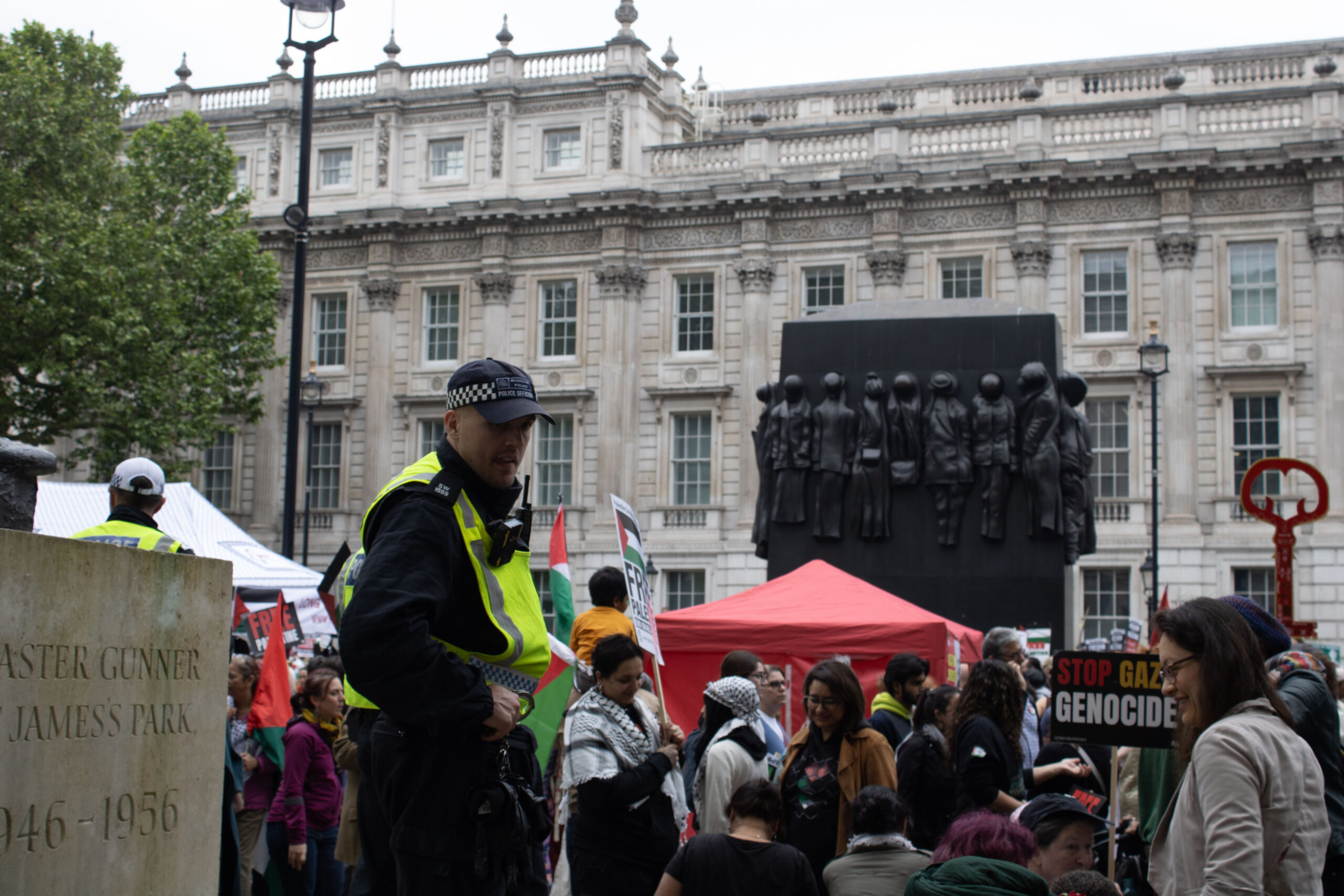The New Public Order Act and new legislation have put heavy limitations on protests in the country
A noisy crowd was marching through Oxford Street wearing keffiyehs and waving Palestinian flags, when Jacob, who for safety reasons does not want to disclose his real name, felt a tap on his shoulder. A police officer started asking questions about his placard reading “intifada till victory” – one of the many slogans the people around him were chanting. Under the slogan was an explanation of what intifada (“resistance” in Arabic) meant to him.
After answering several questions from the police officer, he walked away. Soon enough he felt a hand on his arm. Police dragged him to the other side of the road and started questioning him again.
An officer explained to Jacob that he was being arrested under the Public Order Act 2023 for displaying the word intifada.
Jacob says he remains under police investigation. His case is not unique. Arrests for similar reasons have become a reality in UK protests. The Public Order Act 2023 was the last step in a series of new laws passed by the Conservative government to crackdown on protests.
The law has granted the police greater powers, lowering the threshold for what is considered “serious disruption”.
“Essentially you have to accept the fact that there’s a very good chance that you’re going to prison if you want to do a protest that is heard by anyone,” says Gabriella Ditton, an organiser from the climate activist group Just Stop Oil. “I don’t think most people understand that in order for a protest to be effective some people are going to be inconvenienced.”
The new laws allow the police to impose a start and finish time for protests and set noise limits. They also criminalise locking-on, where protesters attach themselves to a target, and any act which interferes with the use of key national infrastructure. The restrictions are now extended not only to protest marches but also to static demonstrations.
According to Katy Watts, a lawyer at the human rights association Liberty, these new offences target specific actions which have been a signature part of climate and racial justice activism’s strategy.
“It’s clear that the government is explicitly targeting people protesting about racial justice and the climate crisis,” Watts says.
“The government was determined not to deal with [these issues]. It instead turned to criminalising people who are making their voices heard.”

While the government has targeted certain causes, the police have targeted certain people.
“I do think there was an element of racial profiling,” says Jacob, who is a brown man, about his own arrest. He says he was the only person arrested of those displaying the word intifada.
A May 2024 report by Netpol, a police monitoring network, on the policing of pro-Palestinian protests in Britain, found that “there has been a pattern of racial profiling at demonstrations that has included not only the targeting of Palestinians or Arabic-speaking protesters but also Black and brown children and young people.”
The report also found that there were systemic abuses of power from Police Scotland throughout the COP26 conference and its associated climate protests.
“Every copper thinks that they are a good person and [so] you can trust them with more power and they won’t use it when it’s not appropriate. But that is total and utter fiction,” claims Paul Stephens, a retired policeman turned climate activist. “There will be exceptions where it will be used in the wrong way.”
The right to protest is fundamental to democracy and is a right protected by international law and by Article 11 of the UK Human Rights Act.
“The law has created an atmosphere where people are uncertain about whether or not they can take to the streets to exercise their right to protest,” says Watts. “That [has a] real chilling effect on people.”
“This government fully supports the right of individuals to engage in peaceful protest,” says the Home Office website. “However, the serious disruption caused by a small minority of protestors has highlighted that more needs to be done to protect the public and businesses from these unacceptable actions.”
Crowds continue to fill the streets of the UK, in demonstrations for climate justice, human rights, and against war. As the country heads for a general election, it is yet to be seen how the legislation will continue to affect the right to protest.
Feature image: Police looking over protesters in London in 2024. Family at a protest in London in 2024. Photo credit: Roberta Spada.

